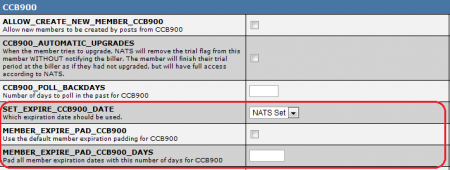Difference between revisions of "NATS4 MEMBER EXPIRE PAD"
| Line 21: | Line 21: | ||
Rather than having the same expire pad for every biller, [[NATS]] allows you to create custom expire pads for specific billers. This allows you to delay member expiration by a specific number days for members who paid for their membership through a specific biller. | Rather than having the same expire pad for every biller, [[NATS]] allows you to create custom expire pads for specific billers. This allows you to delay member expiration by a specific number days for members who paid for their membership through a specific biller. | ||
| − | For example: You have your ''MEMBER_EXPIRE_PAD'' set to three days, but you notice that Epoch always needs four days to process your rebills. Therefore, you can set your [[NATS]] to give | + | For example: You have your ''MEMBER_EXPIRE_PAD'' set to three days, but you notice that Epoch always needs four days to process your rebills. Therefore, you can set your [[NATS]] to give Epoch a four day pad, and your remaining billers would still have the three day pad. |
To configure member expiration for a specific biller, scroll down on the Biller Configurations page to the specific biller you wish to customize. Each biller will have their own specific expire pad fields-- ''MEMBER_EXPIRE_PAD_''(Biller's name), and ''MEMBER_EXPIRE_PAD_''(Billers name)''DAYS.'' | To configure member expiration for a specific biller, scroll down on the Biller Configurations page to the specific biller you wish to customize. Each biller will have their own specific expire pad fields-- ''MEMBER_EXPIRE_PAD_''(Biller's name), and ''MEMBER_EXPIRE_PAD_''(Billers name)''DAYS.'' | ||
Revision as of 14:57, 4 June 2012
MEMBER_EXPIRE_PAD
MEMBER_EXPIRE_PAD, implemented in NATS 3.1, provides the ability to prevent member accounts from expiring until several days after their payment is due. This is useful as it allows for delays in processing transactions from the biller due to possible delays in receiving rebills-- time zone differences, delays in biller processing, etc. This does not delay the actual payment due date, and it does not give the member extra access if the processor reports an explicit cancel or expire. This feature simply gives the member extra days in case we have not heard from the processor at all. By default, NATS is configured to add 1(one) day of expiration delay to all memberships.
To change the configuration of this feature, go to the NATS4 Configuration Admin and select "Billers" from the Current Section drop-down list at the top of the page. You should then see two fields regarding expire pads: MEMBER_EXPIRE_PAD and MEMBER_EXPIRE_PAD_DAYS.
- MEMBER_EXPIRE_PAD_DAYS - Adds a flat number of days to delay membership expiration, regardless of membership length.
- MEMBER_EXPIRE_PAD - Delays expiration by 50%, with a minimum of one day and a maximum of seven days. For example, a ten-day membership will not expire until the fifteenth day, a three-day trial membership will not expire until the fifth day, a thirty day trial will not expire until the thirty-seventh day, etc. If the MEMBER_EXPIRE_PAD box is checked, NATS will ignore any number entered in the MEMBER_EXPIRE_PAD_DAYS box.
Changing this feature will affect all transactions going forward, but will not modify the current expire dates for existing members.
Custom Biller Padding
Rather than having the same expire pad for every biller, NATS allows you to create custom expire pads for specific billers. This allows you to delay member expiration by a specific number days for members who paid for their membership through a specific biller.
For example: You have your MEMBER_EXPIRE_PAD set to three days, but you notice that Epoch always needs four days to process your rebills. Therefore, you can set your NATS to give Epoch a four day pad, and your remaining billers would still have the three day pad.
To configure member expiration for a specific biller, scroll down on the Biller Configurations page to the specific biller you wish to customize. Each biller will have their own specific expire pad fields-- MEMBER_EXPIRE_PAD_(Biller's name), and MEMBER_EXPIRE_PAD_(Billers name)DAYS.
- MEMBER_EXPIRE_PAD_(Billers name) - Delays expiration by for this biller by 50%, with a minimum of one day and a maximum of seven days. For example, a ten-day membership will not expire until the fifteenth day, a three-day trial membership will not expire until the fifth day, a thirty day trial will not expire until the thirty-seventh day, etc. If the MEMBER_EXPIRE_PAD box is checked, NATS will ignore any number entered in the MEMBER_EXPIRE_PAD_DAYS box.
- MEMBER_EXPIRE_PAD_(Billers name)DAYS - Adds a flat number of days to delay membership expiration, regardless of membership length.
- SET_EXPIRE_(Billers name)DATE - How the expire pad date is to be determined. The default setting for every biller is "NATS set". Through the drop down menu, this can be set to:
- NATS set - The expire pad length is determined by what has been set in NATS. This is the default setting.
- Biller set - The expire pad length is determined by what the specific biller has specified their pad to be, and the NATS configurations are ignored.
- Earliest - The expire pad length is either what is set in NATS or what is set by the biller, whichever occurs earler.
- Latest - The expire pad length is either what is set in NATS or what is set by the biller, whichever occurs later.

